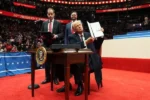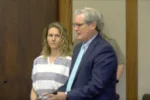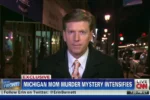Imagine going to your favorite place to pray and feel safe, only to learn that there could be officers waiting outside. That’s what some religious groups, like Baptists, Quakers, and Sikhs, are worried about right now. A judge in Maryland has stepped in to protect their churches from new immigration rules that could send armed officers to their worship services. This decision is important because it helps keep these special places safe for everyone, especially for immigrants who are part of their communities. Let’s explore how this ruling affects religious freedom and why it matters for all of us.
| Category | Details |
|---|---|
| Judge’s Decision | A Maryland judge blocked Trump’s 2025 immigration policy enforcement at places of worship for Cooperative Baptists, Quakers, and Sikhs. |
| Reasoning | The enforcement would negatively impact the ability of these groups to worship freely and serve immigrant communities. |
| Judge’s Name | U.S. District Judge Theodore Chuang issued the preliminary injunction. |
| Groups Involved | Cooperative Baptist Fellowship (CBF), Quakers, and Sikh Temple. |
| Legal Basis | The groups argue that the enforcement violates their First Amendment rights to free exercise of religion. |
| Previous Policies | Under Biden’s administration, places of worship were protected, with enforcement only allowed in narrow circumstances. |
| Concerns Raised | The presence of armed officers would deter worship and violate the peaceful nature of their faiths. |
| Community Impact | Fear of enforcement actions has led to decreased attendance at worship services. |
| Shared Belief | All groups emphasize the importance of welcoming immigrants as a fundamental aspect of their faith. |
Understanding the Impact of Immigration Policies on Religious Freedom
Immigration policies can significantly affect how religious groups operate and serve their communities. The recent injunction against the Trump administration’s enforcement at houses of worship highlights this issue. Many places of worship, such as those for Baptists, Quakers, and Sikhs, strive to support immigrants, including those without legal status. By enforcing immigration laws in these sacred spaces, it creates fear among worshippers and disrupts the community’s ability to practice their faith freely.
Judge Theodore Chuang’s ruling reflects a growing concern about religious freedom in the context of immigration enforcement. The decision recognizes that faith groups often welcome immigrants and provide essential services to them. This ruling aims to protect the rights of these religious organizations to serve their communities without the threat of government intervention. It emphasizes the need for a balance between immigration enforcement and the rights of individuals to worship freely.
The Role of Places of Worship as Safe Havens
Places of worship have traditionally been seen as safe havens for people in need, including immigrants. Many religious groups, such as the Cooperative Baptists, Quakers, and Sikhs, actively support and welcome immigrants as part of their core beliefs. This role is especially vital during times when individuals may fear deportation or legal consequences. By providing a sanctuary, these organizations foster a sense of community and belonging, essential for those who might feel isolated due to their immigration status.
The recent lawsuits filed by various religious groups emphasize that houses of worship are not just places for spiritual gatherings but also centers for community support. They provide vital services like food, shelter, and legal aid to immigrants. The potential presence of armed enforcement in these spaces could deter people from seeking help and attending services. Keeping these places safe from immigration enforcement allows them to continue their mission of compassion and service to all, regardless of their legal status.
Why Religious Groups are United Against Immigration Enforcement
Religious groups across different faiths have united in opposition to aggressive immigration enforcement, citing shared values of dignity and care for all individuals. This coalition includes Christian and Jewish organizations alongside Baptists, Quakers, and Sikhs, all standing firm in their belief that every person deserves respect and support. Their unified stance is rooted in the principle that welcoming the stranger is a fundamental aspect of their faith, reflecting a commitment to love thy neighbor.
The lawsuits filed by these diverse groups illustrate a collective concern that immigration policies threaten not only their ability to serve but also their right to practice their religion freely. With many congregations consisting of immigrants, including undocumented individuals, the fear of enforcement actions can stifle their community’s spirit. By joining forces, these religious organizations aim to protect their sacred spaces and affirm their commitment to inclusivity and compassion, essential elements of their beliefs.
Understanding the Legal Landscape of Religious Freedom and Immigration Enforcement
The intersection of religious freedom and immigration enforcement is a complex legal landscape. The lawsuit filed by the Cooperative Baptists, Quakers, and Sikhs highlights the First Amendment’s critical role in protecting the right to worship freely. Judge Chuang’s decision underscores the importance of safeguarding houses of worship from federal enforcement actions, particularly in communities that serve vulnerable immigrant populations. This legal precedent may serve as a pivotal moment for other religious groups seeking similar protections.
In recent years, the legal framework surrounding immigration has evolved dramatically, often leading to tensions between state policies and religious freedoms. With the Trump administration’s updated 2025 immigration policy allowing enforcement in places previously considered safe, such as churches and schools, many faith leaders are concerned. They argue that such policies not only threaten their congregations’ safety but also contradict the fundamental tenets of their faith, which emphasize compassion and service to all, including undocumented immigrants.
The Impact of Immigration Policies on Faith Communities
The impact of aggressive immigration policies on faith communities cannot be overstated. Many religious organizations, including the plaintiffs in this case, are integral to the support networks for immigrants, providing essential services and a sense of belonging. The fear of deportation and enforcement actions at places of worship has led to decreased attendance and increased anxiety among congregants, undermining the community’s spiritual foundation. This situation raises critical questions about the role of faith communities in advocating for vulnerable populations.
Moreover, the emotional toll on worshippers is significant. The presence of armed enforcement officers at religious services can create an atmosphere of fear and distrust, fundamentally altering the worship experience. For many, places of worship should be sanctuaries free from the threat of government intervention. As Judge Chuang pointed out, the ability to practice one’s faith openly is essential for these communities, and any infringement upon that right must be addressed with urgency and sensitivity.
Community Responses and Solidarity Among Religious Groups
In response to the Trump administration’s immigration policies, a remarkable show of solidarity has emerged among various faith groups. Over two dozen Christian and Jewish organizations have joined the fight against these policies, asserting that the call to welcome the stranger is a core tenet of many religious traditions. This united front not only amplifies the voices of those directly affected but also highlights the shared values of compassion and dignity across different faiths, creating a powerful movement for justice.
These collaborative efforts reflect a growing recognition that the challenges posed by immigration enforcement are not isolated to specific communities. By standing together, faith groups are not only advocating for their rights but also reinforcing the importance of interfaith dialogue and cooperation in addressing social justice issues. This solidarity demonstrates that the fight for religious freedom and the protection of vulnerable populations is a collective responsibility that transcends individual beliefs.
Looking Ahead: The Future of Immigration Enforcement and Religious Freedom
As the legal battles surrounding immigration enforcement at religious sites continue, the future remains uncertain. The preliminary injunction issued by Judge Chuang serves as a temporary reprieve for the plaintiffs, but the broader implications of this case could influence future policies and judicial decisions. The outcomes of such cases may redefine the boundaries of religious freedom and government authority in sensitive areas, highlighting the need for careful consideration of the rights of all individuals.
Looking ahead, it is essential for both lawmakers and religious leaders to engage in constructive dialogue about the balance between enforcing immigration laws and protecting the sanctity of places of worship. This ongoing conversation can help ensure that policies reflect the values of compassion and community support that many religious traditions espouse. Ultimately, fostering a more inclusive and just society will require collaboration among diverse groups to advocate for policies that honor both religious freedom and human rights.
Frequently Asked Questions
Why did the judge block Trump’s immigration policy at places of worship?
The judge blocked the policy because it could harm how groups like Quakers and Sikhs worship freely. They believe armed officers in their places of worship go against their religious beliefs.
What are ‘sensitive locations’ in immigration enforcement?
‘Sensitive locations’ are places like schools and churches where immigration officers usually don’t go. They are seen as safe spaces for people, especially for those who might be worried about their status.
How do Quakers and Sikhs feel about armed officers in worship services?
Quakers believe that having armed people at their services is not acceptable because of their commitment to peace. Sikhs also feel that it threatens their ability to worship safely.
What is the main concern of religious groups about the updated immigration policy?
The main concern is that the policy makes it harder for them to welcome and help immigrants, which is a big part of their faith. They fear it could scare people away from attending services.
What actions are religious groups taking against Trump’s immigration policy?
Religious groups, like the Cooperative Baptists and Quakers, filed lawsuits to protect their places of worship from immigration enforcement, claiming it violates their rights to practice their faith.
Why is it important for places of worship to remain safe from immigration enforcement?
It’s important because these places serve as support systems for many immigrants. They offer community and help, and fear of enforcement can prevent people from seeking those services.
What did Judge Chuang say about the faith practices of these religious groups?
Judge Chuang noted that these groups believe everyone should be welcomed regardless of their immigration status, and this belief is central to how they practice their faith.
Summary
The content discusses a Maryland judge’s decision to block the Trump administration’s 2025 immigration policy from being enforced at places of worship for Cooperative Baptists, Quakers, and Sikhs. Judge Theodore Chuang issued a preliminary injunction, emphasizing that armed enforcement would hinder the ability of these groups to practice their faith. The ruling addresses concerns that immigration enforcement at worship sites violates the First Amendment rights of these religious communities, which serve significant immigrant populations. The ongoing legal battle reflects broader tensions between religious freedom and immigration policies, impacting congregational attendance due to fears of enforcement actions.







